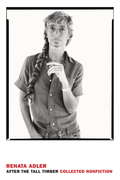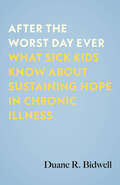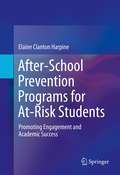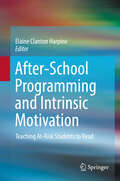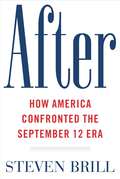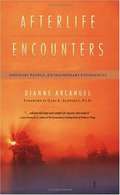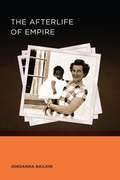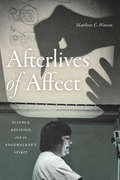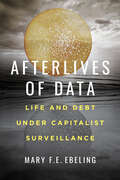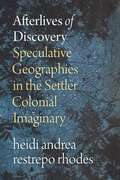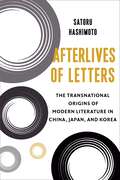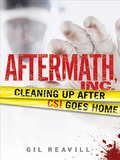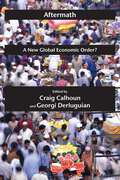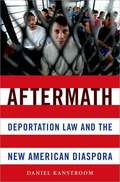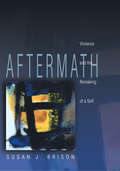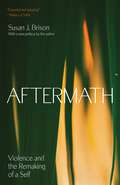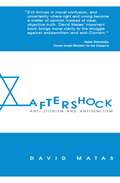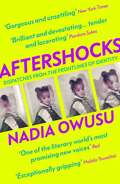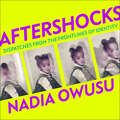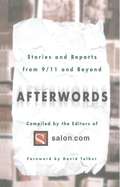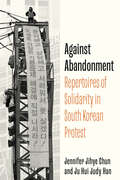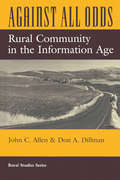- Table View
- List View
After the Tall Timber
by Michael Wolff Renata AdlerWhat is really going on here? For decades Renata Adler has been asking and answering this question with unmatched urgency. In her essays and long-form journalism, she has captured the cultural zeitgeist, distrusted the accepted wisdom, and written stories that would otherwise go untold. As a staff writer at The New Yorker from 1963 to 2001, Adler reported on civil rights from Selma, Alabama; on the war in Biafra, the Six-Day War, and the Vietnam War; on the Nixon impeachment inquiry and Congress; on cultural life in Cuba. She has also written about cultural matters in the United States, films (as chief film critic for The New York Times), books, politics, television, and pop music. Like many journalists, she has put herself in harm's way in order to give us the news, not the "news" we have become accustomed to--celebrity journalism, conventional wisdom, received ideas--but the actual story, an account unfettered by ideology or consensus. She has been unafraid to speak up when too many other writers have joined the pack. In this sense, Adler is one of the few independent journalists writing in America today.This collection of Adler's nonfiction draws on Toward a Radical Middle (a selection of her earliest New Yorker pieces), A Year in the Dark (her film reviews), and Canaries in the Mineshaft (a selection of essays on politics and media), and also includes uncollected work from the past two decades. The more recent pieces are concerned with, in her words, "misrepresentation, coercion, and abuse of public process, and, to a degree, the journalist's role in it." With a brilliant literary and legal mind, Adler parses power by analyzing language: the language of courts, of journalists, of political figures, of the man on the street. In doing so, she unravels the tangled narratives that pass for the resolution of scandal and finds the threads that others miss, the ones that explain what really is going on here--from the Watergate scandal, to the "preposterous" Kenneth Starr report submitted to the House during the Clinton impeachment inquiry, to the plagiarism and fabrication scandal of the former New York Times reporter Jayson Blair. And she writes extensively about the Supreme Court and the power of its rulings, including its fateful decision in Bush v. Gore.
After the Worst Day Ever: What Sick Kids Know About Sustaining Hope in Chronic Illness
by Duane R. BidwellFor those who care for chronically ill children, a new understanding of hope that equips adults to better nurture pediatric hope among sick kids—articulated by the children themselvesAs anyone with a chronic illness knows, hope can sometimes be hard to come by. For parents and caregivers of children with serious illness, there can be a real struggle to move beyond one's own grief, fear, and suffering to see what hope means for these kids.Duane Bidwell, a scholar, minister, and former hospital chaplain who has struggled with serious illness himself, spent time with 48 chronically ill children in dialysis units and transplant clinics around the United States. Chronically ill kids, he found, don&’t adhere to popular or scholarly understandings of hope. They experience hope as a sense of well-being in the present, not a promise of future improvement, an ability to set goals, or the absence of illness and suffering. With this mindset, these kids suggest a new understanding of pediatric hope, saying hope becomes concrete when they (1) realize community, (2) claim power, (3) attend to Spirit, (4) choose trust, and (5) maintain identity.Offering textured portraits of children with end-stage kidney disease, After the Worst Day Ever illustrates in their words how sick children experience, maintain, and turn toward hope even when illness cannot be cured and severely limits quality of life. Their insights reveal how the adults in a sick child's world—parents, chaplains, medical professionals, teachers, and others—can nurture hope. They also shift our understanding of hope from an internal resource located &“inside&” an individual to a shared, communal experience that becomes a resource for individuals.Rich and moving, Bidwell&’s work helps us imagine anew what it means to sustain hope despite inescapable suffering and the limits of chronic illness.
After-School Prevention Programs for At-Risk Students: Promoting Engagement and Academic Success
by Elaine Clanton HarpineAfter-School Prevention Programs for At-Risk Students offers professionals a detailed framework for developing and enhancing after-school programs. Emphasizing a prevention focus and a group-centered interactive approach, the book's year-long model combines education and counseling, incorporating key therapeutic objectives to foster academic and behavior skills and reduce problems in and outside class. Practical step-by-step guidelines for creating and implementing programs include clear rationales, instructive design and case examples, and ready-to-use interventions. The author also provides guidance on developmental, gender, and cultural considerations, the challenges of maintaining progress over the course of the school year, and the handling of severe learning and emotional problems. Among the topics covered: Organizing a group-centered after-school program.Combining learning and counseling into one curriculum.The role of motivation in an ongoing year-long program.Group process, self-efficacy, cohesion: applying the principles of change.Interaction in a year-long program.Solving problems and conflicts. After-School Prevention Programs for At-Risk Students is an essential reference for scientist-practitioners, clinicians, and academics in such disciplines as school psychology, childhood education, social work, psychotherapy and counseling, and learning and instruction.
After-School Programming and Intrinsic Motivation: Teaching At-Risk Students to Read
by Elaine Clanton HarpineThis book examines the eight-year development of the Reading Orienteering Club after-school program, showing how to develop, test, change, and adapt an after-school program to fit the needs of the children who attend. It includes case studies and data reports for each year and presents the theory, application, and program evaluation steps that workers in the field or students learning about program design must follow. Chapters present first-person accounts as well as statistical evaluations of the effectiveness of the reading program with each group of children. In addition, chapters highlight the changes that were made in program design and why each change was implemented, giving practitioners the insights needed to adapt interventions and strategies to their own programs. The book concludes with recommendations from the authors on how to run a successful after-school reading program. Topics featured in this book include:The effect of intrinsic motivation to mental wellness in the classroom.The importance of oral reading in correcting reading failure.Group-center approaches to teaching reading in the classroom.How to select the best evaluation tool.The challenges of mixing inner city and rural students in a reading program. After-School Programming and Intrinsic Motivation is an essential reference for scientist-practitioners, clinicians, researchers, and graduate students in such disciplines as school psychology, childhood education, social work, psychotherapy and counseling, and learning and instruction.
After: How America Confronted the September 12 Era
by Steven BrillThe story begins on September 12, 2001. It reads like a novel. But the characters in award-winning journalist Steven Brill's America are real. They don't have all the answers or all the virtues of fictional heroes. It is because they are so human -- so much like the rest of us -- that makes the way they rise to the challenge of September 12 such an inspiring story about how America really works. A Customs inspector somehow has to guard against a nuclear bomb that could be hidden in one of the thousands of cargo containers from all over the world sitting on his dock in New York harbor. A young woman in New Jersey, suddenly widowed with three young children, doesn't know how to get the keys to her husband's car, much less how she can challenge the head of a federal victims' fund. An entrepreneur in Silicon Valley, who makes machines that screen luggage for bombs, can't decide if this crisis is an opportunity he should seize. Attorney General John Ashcroft has no idea how to find the new, hidden enemy living among us. The young, just-hired director of the American Civil Liberties Union wonders how he can keep Ashcroft from going too far. The CEO of a giant insurer has to decide whether to risk economic panic by not paying damage claims that he might legally be able to avoid. Red Cross President Bernadine Healy has to figure out how to collect and allocate donations while dodging a hostile board of directors. Career civil servant Gale Rossides has to recruit and train the largest workforce ever hired by the government -- the new airport passenger screeners. A proprietor of a shoe repair shop -- helped by two young women, pro bono lawyers -- has to rebuild a business buried in the rubble of Ground Zero. A Detroit Border Patrol agent -- whose bosses want to fire him for speaking out about how unprotected his stretch of border is -- has to choose whether to risk his family's livelihood by sounding the alarm. Tom Ridge has to run through a bureaucratic wall to mount a true homeland security defense. Drawing on 347 on-the-record interviews and revelations from memos of government meetings, court filings, and other documents, Brill gives us a front-row seat as these and other players in this real-life drama cross paths in a series of alliances and confrontations and fight for their own interests and their version of the public interest. The result is a gritty story -- and trailblazing journalism -- that inspires us not because these Americans or their country are perfect, but because they were tough enough, anchored enough, and living in a system that encouraged and enabled them to meet the awesome challenges they faced.
Afterlife Encounters: Ordinary People, Extraordinary Experiences
by Dianne ArcangelPerhaps the best evidence of after death communication is that ordinary people have been experiencing them since the beginning of recorded history. In this book, Dianne Arcangel reveals the results of her five-year international survival study by using real stories from real people as she catagorizes the data. Both the stories and the data are rather amazing. If that was all the book was about, it would be well worth reading, but it isn't. Also fascinating to read about is her participation in the Afterlife Watching experiments involving mediumship research.
Afterlife of Empire (Berkeley Series in British Studies #4)
by Jordanna BailkinThe Afterlife of Empire is an award-winning investigation on how decolonization transformed British society in the 1950s and 1960s. Although usually charted through its diplomatic details, the collapse of the British empire was also a deeply personal process that altered everyday life, restructuring routines, individual relationships, and social interactions. The book traces a set of diverse yet interrelated and richly compelling stories: West Indian migrants repatriated for mental illness, young Britons volunteering in the former colonies, overseas students seeking higher education, polygamous husbands and wives facing invalidation of their marriages, West African children raised by white, working-class British families, and Irish deportees suspected of terrorism. Postwar welfare–from mental health to child care–was never simply a British story, but was shaped by global forces, from the experiences and expectations of individual migrants to the emergence of new legal regimes in Africa and Asia. The book thus recasts the genealogy and geography of welfare by charting its unseen dependence on the end of empire. Using a wealth of recently declassified files from the National Archives, oral histories, court cases, press reports, social science writings, and photographs, Jordanna Bailkin illuminates the relationship between the postwar and the postimperial. The Afterlife of Empire is the winner of several notable prizes including The Morris D. Forkosch Prize from the American Historical Association, the Stansky Book Prize from the North American Conference on British Studies, and the 2013 Biennial Book Prize from the Pacific Conference on British Studies.
Afterlives of Affect: Science, Religion, and an Edgewalker’s Spirit
by Matthew C. WatsonIn Afterlives of Affect Matthew C. Watson considers the life and work of artist and Mayanist scholar Linda Schele (1942–98) as a point of departure for what he calls an excitable anthropology. As part of a small collective of scholars who devised the first compelling arguments that Maya hieroglyphs were a fully grammatical writing system, Schele popularized the decipherment of hieroglyphs by developing narratives of Maya politics and religion in popular books and public workshops. In this experimental, person-centered ethnography, Watson shows how Schele’s sense of joyous discovery and affective engagement with research led her to traverse and disrupt borders between religion, science, art, life, death, and history. While acknowledging critiques of Schele’s work and the idea of discovery more generally, Watson contends that affect and wonder should lie at the heart of any reflexive anthropology. With this singular examination of Schele and the community she built around herself and her work, Watson furthers debates on more-than-human worlds, spiritualism, modernity, science studies, affect theory, and the social conditions of knowledge production.
Afterlives of Data: Life and Debt under Capitalist Surveillance
by Mary F.E. EbelingWhat our health data tell American capitalism about our value—and how that controls our lives.Afterlives of Data follows the curious and multiple lives that our data live once they escape our control. Mary F. E. Ebeling's ethnographic investigation shows how information about our health and the debt that we carry becomes biopolitical assets owned by healthcare providers, insurers, commercial data brokers, credit reporting companies, and platforms. By delving into the oceans of data built from everyday medical and debt traumas, Ebeling reveals how data about our lives come to affect our bodies and our life chances and to wholly define us.Investigations into secretive data collection and breaches of privacy by the likes of Cambridge Analytica have piqued concerns among many Americans about exactly what is being done with their data. From credit bureaus and consumer data brokers like Equifax and Experian to the secretive military contractor Palantir, this massive industry has little regulatory oversight for health data and works to actively obscure how it profits from our data. In this book, Ebeling traces the health data—medical information extracted from patients' bodies—that are digitized and repackaged into new data commodities that have afterlives in database lakes and oceans, algorithms, and statistical models used to score patients on their creditworthiness and riskiness. Critical and disturbing, Afterlives of Data examines how Americans' data about their health and their debt are used in the service of marketing and capitalist surveillance.
Afterlives of Discovery: Speculative Geographies in the Settler Colonial Imaginary
by heidi andrea rhodesIn Afterlives of Discovery, heidi andrea restrepo rhodes traces global and national histories as they entangle through the concept and material life of Discovery across Colombia’s evolution into a liberal settler colonial state. Rather than seeing Discovery as a singular event or bygone era, rhodes theorizes Discovery as a globally encompassing, racialized formation of domination and geographic speculation that continues to structure settler colonialism. Discovery’s logics, they argue, are rooted in colonial and capitalist fantasies projected onto the racialized space and place of the colonized other. rhodes draws on critical theory, human rights research, and Colombian archives to challenge dominant narratives that maintain the Colombian armed conflict began as a Marxist insurgency in 1964. Instead, rhodes shows that the conflict is an extension of Discovery’s ongoingness via projects of dispossession, extraction, whitening, and epistemic and political hegemony. Given that Colombia’s national past, present, and future are grounded in Discovery, rhodes asks: How is it possible to build futures that escape Discovery’s grasp?
Afterlives of Letters: The Transnational Origins of Modern Literature in China, Japan, and Korea (Studies of the Weatherhead East Asian Institute, Columbia University)
by Satoru HashimotoWhen East Asia opened itself to the world in the nineteenth century, Chinese, Japanese, and Korean intellectuals had shared notions of literature because of the centuries-long cultural exchanges in the region. As modernization profoundly destabilized cultural norms, they ventured to create new literature for the new era.Satoru Hashimoto offers a novel way of understanding the origins of modern literature in a transregional context, drawing on Chinese-, Japanese-, and Korean-language texts in both classical and vernacular forms. He argues that modern literature came into being in East Asia through writerly attempts at reconstructing the present’s historical relationship to the past across the cultural transformations caused by modernization. Hashimoto examines writers’ anachronistic engagement with past cultures deemed obsolete or antithetical to new systems of values, showing that this transnational process was integral to the emergence of modern literature.A groundbreaking cross-cultural excavation of the origins of modern literature in East Asia featuring remarkable linguistic scope, Afterlives of Letters bridges Asian studies and comparative literature and delivers a remapping of world literature.
Aftermath, Inc.
by Gil ReavillNow in paperback, a look into the disturbing but fascinating new field of bio-recovery, as a critically acclaimed crime writer rolls up his sleeves and delves into the world of Aftermath, Inc. The best way to understand the world of Aftermath, Inc. is to imagine life before it. Grief-stricken families of suicide or homicide victims were left to cope on their own. Sometimes police would leave a can of ground coffee behind to soak up the mess. Sometimes local church groups offered to help with the horrific chaos of the scene. Into this void stepped Tim Reifsteck and Chris Wilson, who filled a desperate need by founding their bio-remediation company. Gil Reavill traces their history, introducing us to their clients and employees, and the cops, coroners, and detectives they encounter in their work. Their stories are stranger than fiction, and utterly human and compelling.
Aftermath: A New Global Economic Order? (Possible Futures)
by Craig Calhoun Georgi DerluguianThe global financial crisis showed deep problems with mainstream economic predictions, as well as the vulnerability of the world's richest countries and the enormous potential of some poorer ones. China, India, Brazil, and other counties are growing faster than Europe or America and have weathered the crisis better. Is their growth due to following conventional economic guidelines or to strong state leadership and sometimes protectionism? These issues are basic to the question of which countries will grow in comind decades, as well as the likely conflicts over global trade policy, currency standards, and economic cooperation.Contributors include: Ha-Joon Chang, Piotr Dutkiewicz, Alexis Habiyaremye, James K. Galbraith, Grzegorz Gorzelak, Jomo Kwame Sundaram, Manuel Montes, Vladimir Popov, Felice Noelle Rodriguez, Dani Rodrik, Saskia Sassen, Luc Soete, and R. Bin Wong.Aftermath is the third part of a trilogy comprised of the first three books in the Possible Future series. Volume 1: Business as UsualVolume 2: The Deepening CrisisVolume 3: AftermathThe three volumes are linked by a common introduction and can be purchased individually or as a set.
Aftermath: Deportation Law and the New American Diaspora
by Daniel KanstroomSince 1996, when new, harsher deportation laws went into effect, the United States has deported millions of noncitizens back to their countries of origin. While the rights of immigrants-with or without legal status--as well as the appropriate pathway to legal status are the subject of much debate, hardly any attention has been paid to what actually happens to deportees once they "pass beyond our aid. " In fact, we have fostered a new diaspora of deportees, many of whom are alone and isolated, with strong ties to their former communities in the United States. Daniel Kanstroom, author of the authoritative history of deportation, Deportation Nation, turns his attention here to the current deportation system of the United States and especially deportation's aftermath: the actual effects on individuals, families, U. S. communities, and the countries that must process and repatriate ever-increasing numbers of U. S. deportees. Few know that once deportees have been expelled to places like Guatemala, Cambodia, Haiti, and El Salvador, many face severe hardship, persecution and, in extreme instances, even death. Addressing a wide range of political, social, and legal issues, Kanstroom considers whether our deportation system "works" in any meaningful sense. He also asks a number of under-examined legal and philosophical questions: What is the relationship between the "rule of law" and the border? Where do rights begin and end? Do (or should) deportees ever have a "right to return"? After demonstrating that deportation in the U. S. remains an anachronistic, ad hoc, legally questionable affair, the book concludes with specific reform proposals for a more humane and rational deportation system.
Aftermath: Life in Post-Roe America
by Elizabeth G. HinesAfter nearly fifty years as settled constitutional law, the federally protected right to an abortion in America is now a thing of the past. The Supreme Court’s overturning of Roe v. Wade has left Americans without a guaranteed right to access abortion―and the cost of that upheaval will be most painfully felt by individuals who already struggle with access to resources: the poor, Black and brown communities, and members of the LGBTQIA+ population. Pulling together the experiences, expertise, and perspectives of more than 30 writers, thinkers, and activists, Aftermath: Life in Post-Roe America offers a searing look at the critical role Roe has played in improving women’s and pregnant people’s lives, what a future without Roe may look like, and what options exist for us to secure reproductive freedom in the future. With contributions from Jessica Valenti, Soraya Chemaly, Michele Goodwin, Alyssa Milano, Ruby Sales, Heather Cox Richardson, Robin Marty, Linda Villarosa, Jennifer Baumgardner and more, this anthology is essential reading for anyone who cares about the future of reproductive rights in America―and beyond.
Aftermath: Readings in the Archaeology of Recent Conflict
by John SchofieldConflict and Battlefield Archaeology is a growing and important field in archaeology, with implications on the state of the world today: how humanity has prepared for, reacted to, and dealt with the consequences of conflict at a national and international level. As the field grows, there is an increasing need for research and development in this area. Written by one of the most prominent scholars in this field of growing interest, "Aftermath", offers a clear and important overview to research in the field. It will become an essential source of information for scholars already involved in conflict archaeology as well as those just starting to explore the field. It offers access to previously hard-to-find but important research.
Aftermath: Violence and the Remaking of a Self
by Susan J. BrisonOn July 4, 1990, while on a morning walk in southern France, Susan Brison was attacked from behind, severely beaten, sexually assaulted, strangled to unconsciousness, and left for dead. She survived, but her world was destroyed. Her training as a philosopher could not help her make sense of things, and many of her fundamental assumptions about the nature of the self and the world it inhabits were shattered. At once a personal narrative of recovery and a philosophical exploration of trauma, this book examines the undoing and remaking of a self in the aftermath of violence. It explores, from an interdisciplinary perspective, memory and truth, identity and self, autonomy and community. It offers imaginative access to the experience of a rape survivor as well as a reflective critique of a society in which women routinely fear and suffer sexual violence. As Brison observes, trauma disrupts memory, severs past from present, and incapacitates the ability to envision a future. Yet the act of bearing witness, she argues, facilitates recovery by integrating the experience into the survivor's life's story. She also argues for the importance, as well as the hazards, of using first-person narratives in understanding not only trauma, but also larger philosophical questions about what we can know and how we should live. Bravely and beautifully written, Aftermath is that rare book that is an illustration of its own arguments.
Aftermath: Violence and the Remaking of a Self
by Susan J. BrisonA powerful personal narrative of recovery and an illuminating philosophical exploration of traumaOn July 4, 1990, while on a morning walk in southern France, Susan Brison was attacked from behind, severely beaten, sexually assaulted, strangled to unconsciousness, and left for dead. She survived, but her world was destroyed. Her training as a philosopher could not help her make sense of things, and many of her fundamental assumptions about the nature of the self and the world it inhabits were shattered.At once a personal narrative of recovery and a philosophical exploration of trauma, this bravely and beautifully written book examines the undoing and remaking of a self in the aftermath of violence. It explores, from an interdisciplinary perspective, memory and truth, identity and self, autonomy and community. It offers imaginative access to the experience of a rape survivor as well as a reflective critique of a society in which women routinely fear and suffer sexual violence.As Brison observes, trauma disrupts memory, severs past from present, and incapacitates the ability to envision a future. Yet the act of bearing witness, she argues, facilitates recovery by integrating the experience into the survivor's life's story. She also argues for the importance, as well as the hazards, of using first-person narratives in understanding not only trauma, but also larger philosophical questions about what we can know and how we should live.
Aftershock: Anti-Zionism & Anti-Semitism
by David MatasVerbal attacks against Israel for human rights violations have turned into physical attacks against the Jewish community worldwide. How has that happened? This book attempts to explain the phenomenon. Anti-Zionists, whose primary goal is destruction of the State of Israel, use accusations of the worst forms of human rights violations against Israel to delegitimize the state. These accusations criminalize the Jewish population worldwide for actual or presumed support of the State of Israel. The contemporary international human rights system and the existence of the State of Israel are twin legacies of the Holocaust. The failure of the human rights system to prevent attacks on Israel and the Jews is an aftershock of the Holocaust.
Aftershocks: Dispatches from the Frontlines of Identity
by Nadia Owusu'One of the most moving books of the new year' STYLIST'Gorgeous and unsettling' NEW YORK TIMES'Brilliant and devastating...tender and lacerating' PANDORA SYKES'One of the literary world's most promising new voices' REDI have lived in disaster and disaster has lived in me. Our shared languages are thunder and reverberation.When Nadia Owusu was two years old her mother abandoned her and her baby sister and fled from Tanzania back to the US. When she was thirteen her beloved Ghanaian father died of cancer. She and her sister were left alone, with a stepmother they didn't like, adrift. Nadia Owusu is a woman of many languages, homelands and identities. She grew up in Rome, Dar-es-Salaam, Addis Ababa, Kumasi, Kampala and London. And for every new place there was a new language, a new identity and a new home. At times she has felt stateless, motherless and identity-less. At others, she has had multiple identities at war within her. It's no wonder she started to feel fault lines in her sense of self. It's no wonder that those fault lines eventually ruptured. Aftershocks is the account of how she hauled herself out of the wreckage. It is the intimate story behind the news of immigration and division dominating contemporary politics. Nadia Owusu's astonishingly moving and incredibly timely memoir is a nuanced portrait of globalisation from the inside in a fractured world in crisis.
Aftershocks: Dispatches from the Frontlines of Identity
by Nadia OwusuI have lived in disaster and disaster has lived in me. Our shared languages are thunder and reverberation.When Nadia Owusu was two years old her mother abandoned her and her baby sister and fled from Tanzania back to the US. When she was thirteen her beloved Ghanaian father died of cancer. She and her sister were left alone, with a stepmother they didn't like, adrift. Nadia Owusu is a woman of many languages, homelands and identities. She grew up in Rome, Dar-es-Salaam, Addis Ababa, Kumasi, Kampala and London. And for every new place there was a new language, a new identity and a new home. At times she has felt stateless, motherless and identity-less. At others, she has had multiple identities at war within her. It's no wonder she started to feel fault lines in her sense of self. It's no wonder that those fault lines eventually ruptured. Aftershocks is the account of how she hauled herself out of the wreckage. It is the intimate story behind the news of immigration and division dominating contemporary politics. Nadia Owusu's astonishingly moving and incredibly timely memoir is a nuanced portrait of globalisation from the inside in a fractured world in crisis.
Afterwords: Stories and Reports from 9/11 and Beyond
by David TalbotAFTER September 11, 2001, emotions couldn't be clearly defined. There were no WORDS strong enough to justify, avenge, explain, or express the sheer magnitude of this horrifyingly unique moment in history. In this remarkable anthology, compiled by Salon.com's award-winning editorial team, Rick Moody, Janet Fitch, Caroline Knapp, and Jeffrey Eugenides join many contemporary literary talents and reporters in giving a voice to the day that left a stunning roar of silence across America. Dread, fear, heroism, and dignity color these pages from eyewitness accounts of ordinary citizens turned rescue workers, to an escape from the World Trade Center, a report on everyday New Yorkers finding comfort in "terror sex," and stories of miracles in the madness -- like that of a blind man led by his seeing-eye dog down eighty-seven flights of stairs to safety. Afterwords also probes the aftermath of the attacks on the nation and the world's cultural, political, and social fabric through writing ranging from an in-depth interview with controversial social critic Noam Chomsky, to a female Pakistani-American journalist's meeting with a Taliban leader and his wives, and essays on how sheer horror gave way to heartening solidarity, macabre spectacle, and kitschy sentimentality. Immediate, raw, emotional, and empowering, this outstanding collection speaks brilliantly to the simple need to remember and comprehend what happened against that perfect blue sky on September 11, 2001. A portion of the royalties will be donated to the Twin Towers Fund and the Red Cross's Fund for Afghan Children.
Against Abandonment: Repertoires of Solidarity in South Korean Protest
by Jennifer Jihye Chun Ju Hui ChunAcross the world, protest has become a much-debated tactic in struggles against inequality, political corruption, and ecological disaster. In South Korea, protest is a ubiquitous and essential form of political expression. In 1987, mass protests forced reforms that led to democratizing government. In 2017, the Candlelight movement removed the sitting president. Beyond these spectacular national protests, Korean workers and minority groups regularly turn to protest to express their grievances and assert their rights. Based on long-term ethnographic research with labor and social movement activists, Against Abandonment is at once a chronicle of the life-and-death character of protesting precarity in South Korea and a searing examination of repertoires of solidarity for upending injustice. Protest forms such as long-term encampments, life-threatening hunger strikes, and perilous high-altitude occupations are agonizing to perform and to witness but often powerful as catalysts for change. Chun and Han situate South Korean protest in transnational context to demonstrate how the struggles of South Korean workers are inextricably tied to the globalized conditions of neoliberal capitalism. Building on the work of abolitionist feminist thinkers, the book theorizes protest as a political form with far-reaching resonance across history and geography, and underscores the significance of collective survival, self-determination, and emancipatory transformation.
Against All Enemies: Inside America's War on Terror
by Richard A. ClarkeTHE EXPLOSIVE INTERNATIONAL BESTSELLER With all-new excerpts from Richard Clarke's dramatic public testimony, and revealing corroboration from The 9/11 Commission Report From the 9/11 Commission Report: "On the day of the meeting [September 4, 2001], Clarke sent Rice an impassioned personal note. He criticized U. S. counterterrorism efforts past and present. The 'real question' before the principals, he wrote, was 'are we serious about dealing with the al Qida threat'. . . Is al Qida a big deal'. . . Decision makers should imagine themselves on a future day when the CSG has not succeeded in stopping al Qida attacks and hundreds of Americans lay dead in several countries, including the US,' Clarke wrote. 'What would those decision makers wish that they had done earlier? That future day could happen at any time. '"
Against All Odds: Rural Community In The Information Age
by John C AllenThe authors' model orients this community in the vortex of contemporary forces, pointing up, for example, the need for face-to-face interaction among residents versus the larger society's demand for electronic communication. With increasing conflicts between the culture of rural communities and that of the outside world" occurring, small towns all over the United States are losing their businesses, their doctors, and their sense of community. Yet the town described in this study is thriving. Against All Odds identifies pride, determination, and a sense of belonging that must be nurtured,and the local organization that binds all of these factors together,in order to keep a small town alive in the face of powerful disruptive forces. Not since Vidich and Bensman's landmark Small Town in Mass Society has such a thoughful examination of a contemporary rural community been available.
